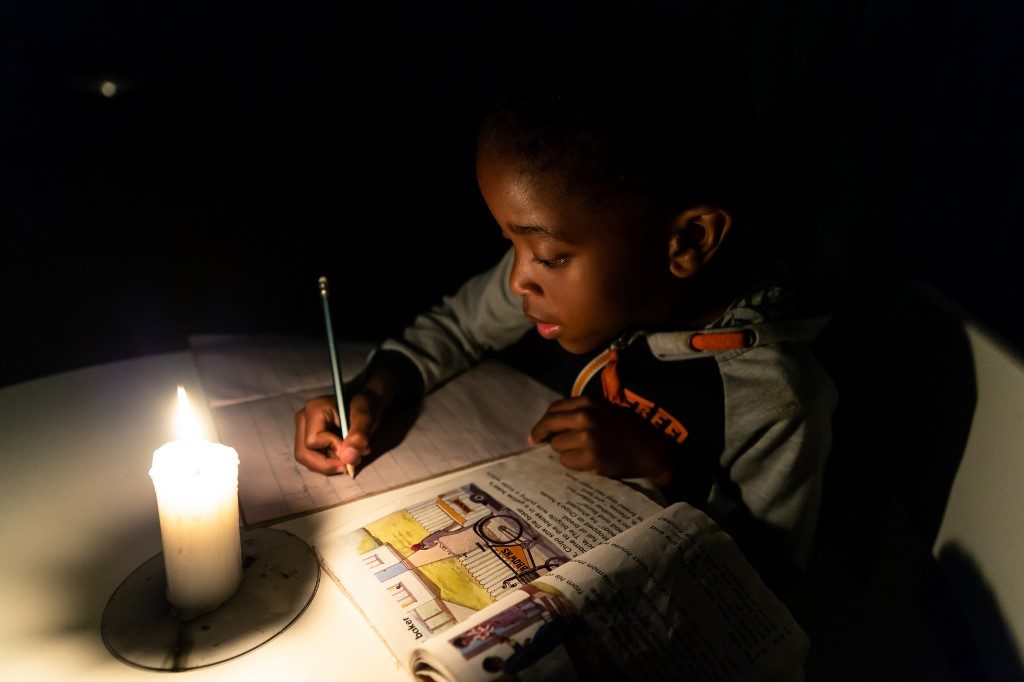SUMMARY
This is AI generated summarization, which may have errors. For context, always refer to the full article.

HARARE, Zimbabwe – Zimbabwe on Wednesday, October 9, quadrupled electricity tariffs amid crippling power shortages which have plunged parts of the country into darkness for up to 18 hours as the economy lurches deeper into crisis.
Zimbabwe’s economy is caught in a major downturn with shortages of fuel, medicine, and currency as well as hyperinflation which has seen many families living on a single meal a day.
Citing “the depreciation of the local currency,” the Zimbabwe Energy Regulatory Authority (ZERA) said the price of electricity would jump to around 162 Zimbabwe cents (11 US cents) per kilowatt hour up from 38 Zimbabwe cents.
It was the second tariff hike in two months. In August authorities imposed price increases of up to 400%.
ZERA said despite the August tariff hike the company was still unable to supply enough power, leading to long hours of outages commonly known as load-shedding.
The latest increase should result in “a significantly improved electricity supply, reduced load-shedding hours, and improved reliability of supply” as the Zimbabwe authorities will import electricity from neighboring countries, ZERA said.
Zimbabwe imposed rolling electricity power cuts in May due to low water levels at the Kariba hydro-power station – where production fell to less than 20% of capacity.
The most recent energy price hike came days after the government increased the price of fuel by more than 25%, the latest in a series of regular increases.
Most Zimbabweans are struggling with the spiraling living costs.
Angry at the latest electricity tariff increase, fruit vendor Reason Magashu said, “It looks like the only agenda of these people in government is to make life difficult for us the poor.”
“This steep hike is bound to have a far-reaching impact on the economy…[putting] more pressure on our inflation numbers,” Harare-based economist Prosper Chitambara told Agence France-Presse.
“We are going to see workers agitating for wage reviews as the cost of living is pushed further up,” he said.
Some 1,800 doctors from state hospitals have been on strike for more than a month for better pay, saying they can neither afford transport to work nor decent meals on their current salaries.
President Emmerson Mnangagwa, who took over from longtime ruler Robert Mugabe, who died in September, has promised to revive the economy, but Zimbabweans say conditions in the country have gotten worse.
‘Life difficult for the poor’
The economy has declined even further, with prices of goods skyrocketing and annual inflation peaking at 176% in June, before government stopped publishing inflation statistics.
The International Monetary Fund said Zimbabwe’s August inflation rate accelerated to 300% and some economists estimate that the real rate may be double that figure.
In January, Mnangagwa announced a more than 100% hike in fuel prices, triggering widespread protests which left at least 17 people dead and scores injured when soldiers opened fire on the crowds.
The United States dollar had been the national currency since 2009 when the country dropped its own currency following hyperinflation of as much as 500 billion percent.
But in June, Zimbabwe ended the use of US dollars and replaced it with two local parallel currencies – “bond notes” and electronic RTGS dollars, which would combine to become the new “Zimbabwe dollar.”
The new “Zimbabwe dollar” does not yet exist in paper form.
Around 7.5 million people – around half of the population – in both rural and urban areas would require food aid by March next year due to a severe drought, according to the United Nations statistics. – Rappler.com
Add a comment
How does this make you feel?
There are no comments yet. Add your comment to start the conversation.